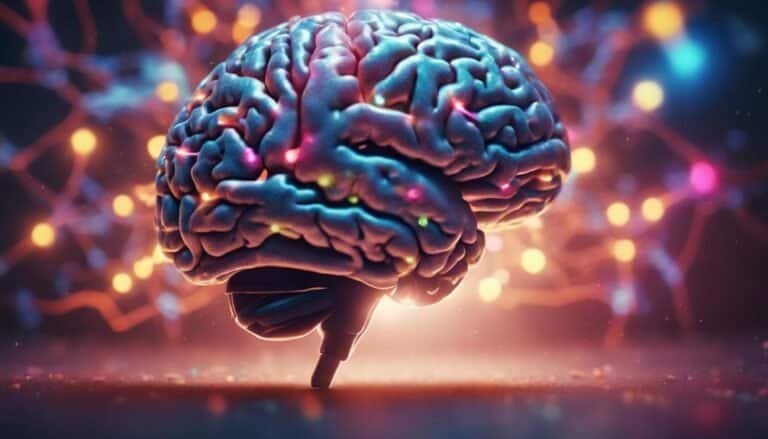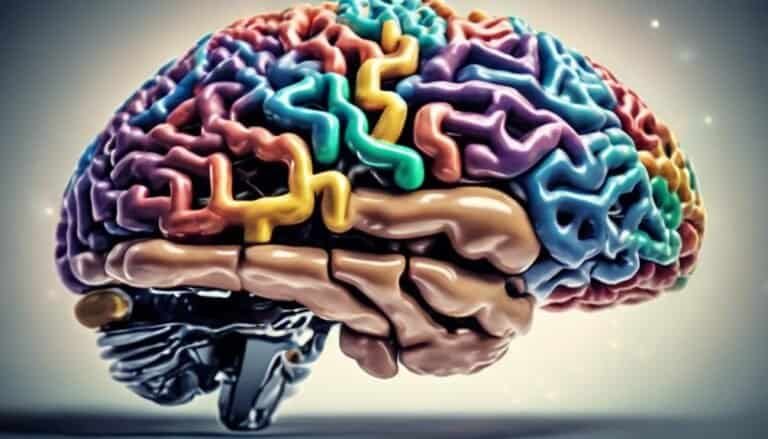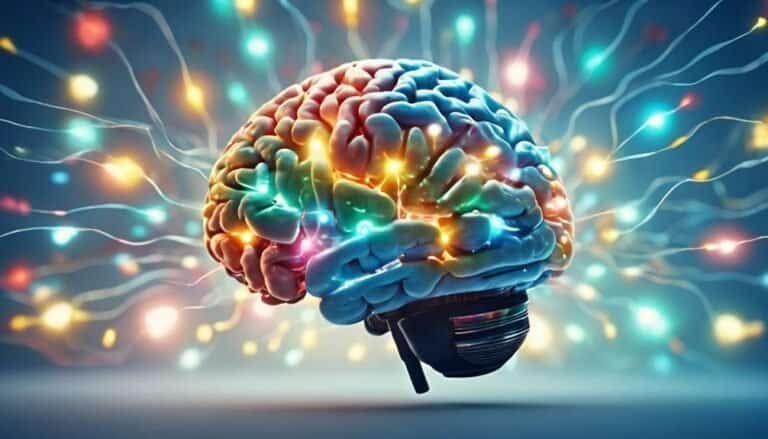Brain and Stress Management Techniques
Feeling stressed out? Your brain might just be playing tricks on you. Discover how understanding the intricate connection between your brain and stress levels can empower you to take charge of your mental well-being.
Dive into a world where mindfulness, cognitive strategies, exercise, nutrition, sleep habits, and social connections all play pivotal roles in managing stress effectively. Explore these techniques to unlock the potential for a calmer, more resilient you.
Key Takeaways
- Mindfulness and meditation techniques improve brain health by reducing stress and enhancing cognitive function.
- Relaxation practices like deep breathing and meditation promote calmness and tranquility in the brain.
- Cognitive behavioral strategies aid in stress reduction through positive self-talk and behavior modification.
- Physical exercise, nutrition, and quality sleep play vital roles in managing stress and maintaining brain health.
Understanding Stress and the Brain
If you've ever wondered how stress affects your brain, you're about to delve into the fascinating world of Understanding Stress and the Brain. Stress can have a significant impact on your brain function and overall well-being. When you experience stress, your body activates the stress response, also known as the fight-or-flight response. This response is crucial for survival in threatening situations, but when activated frequently due to chronic stress, it can have detrimental effects on the brain.
The stress response triggers the release of hormones like cortisol and adrenaline, which can affect the hippocampus, the brain's center for learning and memory. Prolonged exposure to these stress hormones can lead to a decrease in neuroplasticity, the brain's ability to adapt and form new connections. This, in turn, can impair cognitive function, memory retention, and emotional regulation.
Understanding how stress impacts your brain function is the first step in effectively managing stress levels. By implementing stress-reducing techniques and lifestyle changes, you can help mitigate the negative effects of stress on your brain and overall health.
Mindfulness and Meditation Techniques
Let's explore the world of mindfulness and meditation techniques. Discover the numerous benefits of mindfulness, the different types of meditation practices available, and effective methods for relaxation.
Benefits of Mindfulness
Engaging in mindfulness practices can significantly enhance your ability to manage stress and improve overall well-being. Mindfulness benefits extend far beyond just relaxation; they can positively impact various aspects of your life. Here are three key benefits to consider:
- Improved Workplace Productivity: By incorporating mindfulness techniques into your daily routine, you can enhance focus and concentration, leading to increased productivity at work.
- Enhanced Emotional Intelligence: Mindfulness techniques help you become more aware of your emotions and how to regulate them effectively, leading to better relationships and communication skills.
- Reduced Anxiety and Stress: Practicing mindfulness regularly can help lower anxiety levels and reduce overall stress, promoting a sense of calmness and well-being in your daily life.
Types of Meditation
Exploring different types of meditation techniques can provide you with valuable tools to cultivate mindfulness and manage stress effectively. Two common types of meditation are focused attention and loving kindness. Focused attention meditation involves concentrating on a single point of focus, such as your breath or a specific object, to enhance awareness and attention control. On the other hand, loving kindness meditation focuses on developing feelings of compassion and kindness towards oneself and others. By practicing these techniques regularly, you can improve your ability to stay present, reduce anxiety, and enhance emotional well-being. The table below provides a comparison of these two meditation methods:
| Meditation Type | Description | Benefits |
|---|---|---|
| Focused Attention | Concentrate on a single point of focus. | Enhances awareness and attention |
| Loving Kindness | Cultivates feelings of compassion and kindness. | Promotes emotional well-being |
Practices for Relaxation
Practicing mindfulness and meditation techniques can be incredibly beneficial for relaxation and stress management. These practices help you cultivate a sense of calm and focus amidst the chaos of daily life.
Here are some techniques to try:
- Progressive Muscle Relaxation: This involves tensing and then slowly releasing each muscle group in your body, promoting physical relaxation and reducing tension.
- Deep Breathing Techniques: By taking slow, deep breaths, you engage your body's relaxation response, helping to lower stress levels and calm the mind.
- Mindful Meditation: Focusing on the present moment without judgment can help you let go of worries and anxieties, promoting a sense of peace and tranquility.
Incorporating these practices into your routine can lead to a more relaxed and centered state of mind.
Cognitive Behavioral Strategies
When dealing with stress, incorporating Cognitive Behavioral Strategies can be incredibly beneficial.
By practicing Positive Self-Talk Techniques, you can shift your mindset and approach challenges with a more optimistic outlook.
Behavior Modification Strategies also offer practical methods to help you adapt your behaviors and responses to stressors.
Positive Self-Talk Techniques
To enhance your stress management skills, consider incorporating positive self-talk techniques rooted in cognitive behavioral strategies. Positive affirmations can shift your mindset towards positivity, promoting emotional regulation during stressful times.
Monitoring your inner dialogue allows you to identify negative patterns and replace them with constructive thoughts, thus improving coping skills. By recognizing and challenging irrational beliefs through self-talk, you can reframe situations more positively, reducing stress and anxiety.
Behavior Modification Strategies
Consider incorporating behavior modification strategies, specifically cognitive behavioral techniques, to effectively manage stress and promote positive mental well-being. Cognitive behavioral strategies focus on changing negative thought patterns and behaviors that contribute to stress.
One powerful method is creating a reward system for yourself. By setting achievable goals and rewarding yourself when you accomplish them, you can reinforce positive behavior and motivate yourself to continue.
Additionally, habit formation plays a crucial role in stress management. By identifying triggers that lead to stress and developing healthier responses through repetition and reinforcement, you can rewire your brain to react differently to stressors.
Physical Exercise for Stress Relief
Engaging in regular physical activity can significantly help in relieving stress and improving overall mental well-being. When you move your body, you release endorphins that act as natural mood lifters, reducing feelings of anxiety and stress.
Here are three ways physical exercise can benefit your mental health:
- Yoga Therapy: Practicing yoga combines physical postures, breathing exercises, and meditation, promoting relaxation and reducing stress levels. The combination of movement and mindfulness in yoga can help you connect with your body and quiet your mind.
- Breathing Exercises: Incorporating breathing exercises into your workout routine can enhance the relaxation response in your body, calming your mind and reducing stress. Focusing on deep, intentional breathing can help center your thoughts and alleviate tension.
- Cardiovascular Activities: Engaging in aerobic exercises like running, swimming, or cycling can boost your mood by increasing the production of endorphins, helping you combat stress and improve your overall mental well-being.
Nutrition and Diet Impact
Moving from the benefits of physical exercise for stress relief, now let's explore how your nutrition and diet choices impact your stress management and mental well-being. Your diet plays a crucial role in managing stress levels. The foods you consume can either fuel stress or help your body combat it effectively.
One key aspect to consider is gut health. The gut-brain connection is powerful, and a healthy gut can contribute to reduced stress levels and improved mental health. Consuming probiotic-rich foods like yogurt, kefir, and kimchi can support a healthy gut microbiome, positively impacting your stress resilience.
Another important factor is emotional eating. During times of stress, it's common to turn to food for comfort, leading to unhealthy eating habits. Being mindful of your emotional triggers and finding alternative coping mechanisms can help you avoid the pitfalls of emotional eating, promoting better stress management.
| Category | Foods to Include |
|---|---|
| Gut Health | Yogurt, Kefir, Kimchi |
| Stress-Reducing Snacks | Nuts, Seeds, Dark Chocolate |
| Hydration | Water, Herbal Teas |
| Antioxidants | Berries, Spinach, Turmeric |
| Mood-Boosting Foods | Fatty Fish, Whole Grains |
Sleep Hygiene and Stress Management
Taking care of your sleep habits is essential for effectively managing stress and promoting overall well-being. Quality sleep plays a crucial role in stress reduction by allowing your body and mind to rest and recharge.
Here are three key strategies to enhance your sleep hygiene and better manage stress:
- Establish a Consistent Sleep Schedule: Aim to go to bed and wake up at the same time every day, even on weekends. This helps regulate your body's internal clock, promoting better sleep quality.
- Create a Relaxing Bedtime Routine: Wind down before bed with calming activities like reading, taking a warm bath, or practicing deep breathing exercises. This signals to your body that it's time to relax and prepare for sleep.
- Optimize Your Sleep Environment: Make your bedroom a sleep-friendly space by keeping it cool, dark, and quiet. Invest in a comfortable mattress and pillows to support quality sleep and reduce stress levels.
Social Support and Connection
Supportive relationships and social connections play a vital role in managing stress and promoting emotional well-being. Emotional support from friends, family, or a support group can significantly impact your mental health by providing a sense of belonging and comfort during challenging times. Community connections offer a valuable source of stress relief, allowing you to engage in activities that bring joy and relaxation.
| Types of Social Support | Benefits |
|---|---|
| Emotional support | Enhances mental well-being |
| Practical support | Assists in daily tasks and responsibilities |
| Informational support | Provides guidance and advice |
| Companionship | Reduces feelings of loneliness |
Connecting with others not only offers emotional support but also creates a sense of camaraderie and shared experiences. By fostering strong social connections, you can build a support system that aids in coping with stress and improving overall mental resilience. Take the time to nurture these relationships and seek out opportunities to engage with your community for enhanced well-being.
Conclusion
In conclusion, remember that managing stress is crucial for your brain health. Utilize mindfulness, meditation, and cognitive strategies to combat stress.
Engage in physical exercise, maintain a healthy diet, and prioritize sleep hygiene.
Seek social support and connection to alleviate stress. By implementing these techniques, you can strengthen your brain and improve your overall well-being.
Remember, stress can be tamed with thoughtful techniques and consistent practice.







